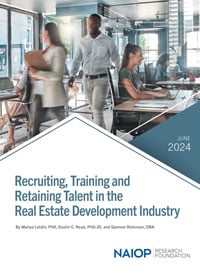Report identifies best practices in recruitment, training and retention.
Bringing on the right talent, then training and keeping that talent are perennial concerns for companies seeking to build a durable advantage over their competitors, especially in a field like commercial real estate development, where professional skills and personal networks are critical to a firm’s success. The commercial real estate industry faces a potential talent shortage as baby boomers age out of the workforce, increasing the importance of having an effective talent management strategy.
The NAIOP Research Foundation’s June 2024 report, “Recruiting, Training and Retaining Talent in the Real Estate Development Industry,” identifies a range of strategies development firms can pursue to attract talented associates and help them develop the skills they will need to contribute to their teams and advance in their careers. The report’s authors, Mariya Letdin, Ph.D., Dustin Read, Ph.D., and Spenser Robinson, D.B.A., reviewed existing literature on talent management in other industries and interviewed senior executives and mid-career managers at commercial real estate development firms to identify common challenges in recruitment, training and retention, and to pinpoint ways that firms can overcome them.

The NAIOP Research Foundation’s June 2024 report Recruiting, Training and Retaining Talent in the Real Estate Development Industry.
The authors observed that the offices of U.S. commercial real estate development firms tend to have fewer staff than those in other industries. This is true even in larger development firms, which commonly assign developers to teams that focus on a region, property type or development strategy and are frequently located in offices across multiple states. Individual development teams are often not large enough to support staff roles dedicated to recruiting or training new hires. Some managers may prefer ad hoc approaches to talent management since the need to hire and onboard new staff is infrequent. However, firms that opt out of investing time and resources in talent management and retention may pay higher recruitment and compensation costs over the long term. They miss out on savings from hiring professionals earlier in their careers or must return to the labor market repeatedly when experienced professionals depart.
There is no one-size-fits-all approach to effective recruitment and training, but talent management practices should align with a firm’s overall strategy. Managers can benefit from adhering to a long-term plan to hire and train professionals with skills that the firm needs to expand. This may mean hiring a candidate or training a current associate for a skill set or specialization that is not currently represented on a team. To maximize opportunities for finding strong candidates, firms can diversify recruitment channels beyond referrals, job boards and third-party recruiters. Developing relationships with universities and trade associations like NAIOP can help identify a broader pool of early and mid-career candidates. Both avenues also offer managers opportunities to familiarize themselves with candidates outside the limited interactions possible in a job interview.
Likewise, training initiatives should be tailored to a firm’s size, resources and culture. In some firms, this might involve greater emphasis on informal shadowing opportunities, while in others, more structured training around a specific skill set or operational role may be more appropriate. Firms can also turn to trade associations for courses that complement in-house training, and associates may benefit from the external mentorship opportunities that trade associations provide.
Effective training programs also support effective retention strategies. Most managers understand that appropriate compensation is crucial to retaining talent. However, keeping associates aware of career development opportunities and ensuring that they feel they have a clear path to advancement are also important, particularly for professionals who are early in their career or new to a firm. Training and mentorship programs demonstrate a firm’s investment in associates’ careers and can help them develop strong personal bonds with colleagues on their teams, making them less likely to hunt for better opportunities elsewhere.
Shawn Moura, Ph.D., is senior research director at NAIOP.






